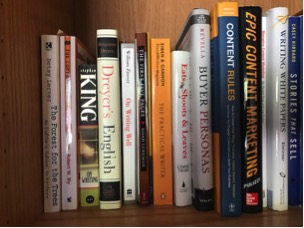
What kind of writer are you? Are you one of those people who get anxious and procrastinate until the last minute? Or, are you like me and see a blank page as an opportunity brimming with promise?
Either way, writing is a muscle that needs to be exercised. The more you write, the easier it is to get words on paper in an orderly fashion. Professional writers – even the most accomplished ones – practice with regularity.
What can you do to improve your writing? Here are some of the things I rely on to keep my writing muscle in tiptop shape.
If you’re suffering from writer’s block or don’t know how to get started, plan to spend 15 or 20 minutes in a free writing exercise. Here’s how it works.
The only goal of free writing – or wild writing as it’s sometimes called – is to enter a writing mode. If you end up with something good out of it, that’s a bonus.

Photo courtesy of Burst on Pexels.com.
A fun way to practice writing is to use writing prompts. A writing prompt is an assigned writing topic you develop into a story. It could be one word, like ‘glimmer’, or it can be a couple of sentences written as a brief. Writer’s Digest has a catalogue of writing prompts to exercise your writing muscle. Work your way through the whole list or pick them randomly. I encourage you to try something you would never write normally. One of the first articles I ever sold to a commercial magazine was inspired by the writing prompt, “A funny thing happened on the way to . . .”.
RELATED: 7 ways to kill your writer’s block
A writing group can challenge you to improve, encourage you throughout a long project, or pick up the pieces when an ambitious plan falls apart. (It happens; I once wrote 120 pages of a novel before realising I hated my main characters. Needless to say, it was a disappointing outcome.)
I’ve been in several writing groups and, like any group, some work better than others depending on what stage you’re at with your writing and what you need most at that point in time. I find a small group of writers works better for me and meeting at least once a week is optimal to progress my writing.
A good writing group provides constructive feedback. You should never feel inadequate – the whole point is to improve. It’s also a good place to make lifelong friends.

Photo courtesy of Christina Morillo on Pexels.com
If you want to refresh your skills or brush up on the latest techniques, a writing workshop can kickstart your motivation and build your confidence.
If you want to know how your writing stacks up – or how you stack up against other writers, start entering contests. It’s a good discipline because you’re usually given a precise set of instructions – a brief – you must fulfil to be considered. Most contests challenge you in some way, whether it’s by topic selection, word count, or even the writers you’re competing against.
One of my favourite writing contests is Reader’s Write in The Sun. Every month the magazine publishes one-word topics for the next several months and invites readers to submit a personal story about the topic. The best submissions are selected for publication.

Photo by Kim Gorga on Unsplash
Google is probably the best way to find the right contest for your sort of writing. A good way to stretch your writing skills is to try your hand at a different kind of writing from what you normally produce. The Australian Writer’s Resource has a great list of competitions they’ve aggregated from several sources.
If you’re like me, there’s no better way to pass an afternoon than getting stuck into a style guide. I use The Chicago Manual of Style as my default. When I’m not sure how to correctly state something in writing, the book sorts me out. It’s useful for big and little issues like whether to use a single quote or a double quote, when to use a semicolon, or whether I’ve cited a reference properly. Just having the five centimetre thick book on my desk makes me feel safer.
But if 5 cm is too daunting, you can’t go wrong with The Elements of Style by William Strunk Jr. At just over 50 pages long, it hits all the highlights and keeps your writing lean and mean – just the way an editor wants it. I have a printed copy of the original 1918 version, but you can get an online copy for free here.
My latest favourite is Dreyer’s English: An Utterly Correct Guide to Clarity and Style. I called it “a romance novel for word nerds” in an earlier post about proofreading. It’s somewhere between a style guide and a book of advice on how to be a better writer. I highly recommend it.
RELATED: 7 reasons you need a proofreader
There are so many books about writing that it’s hard to know where to start. After reading a few, you also begin to wonder if the author has made a living by being a good writer or is making a living by giving advice on something they profess to be proficient at. In other words, whom is this book helping more – me or the author?

A bookshelf in Sarah’s office
Here are my recommendations for books I’ve found useful in improving my writing:
One of the best ways to improve your writing is to commit to a blog. I don’t mean start a blog and then let it languish and make you feel guilty. You need to commit to a regular publishing schedule and push yourself to publish at the same time, every time. When I was getting Global Copywriting established, I decided I was going to publish a blog post twice a week. It made a big difference in my writing, not only because I was producing more, but because it forced me to become very organised in how I approached it.
An added bonus to starting a blog is you immediately begin to build an asset that continues to deliver value long after you publish that first post.
Writers are chatty but not in the usual face-to-face way. They’re very good at social media, online forums, and special groups where they can exchange information with other writers. It makes sense, right? We’re not talkers; we’re writers. The online groups I’ve been involved in have been supportive and fun. You’ll want to find a group specific to your kind of writing. I tend to hang out with other copywriters, but if you’re writing science fiction, they wouldn’t be right for you. The NY Book Editors website has a good list of writing communities, but there are lists everywhere. Start Googling or ask your writer friends where they hang out online with other writers.

Photo by Alexander Hess on Unsplash
It might seem counterintuitive to get writing tips from a podcast. But believe me, listening to other writers speak is a powerful way to up your game. Start with the award-winning Grammar Girl: Quick and Dirty Tips for Better Writing or one of my favourites, The Garret: Writers on Writing, and get ready to be inspired.
This should give you a good start, but I’d love to hear some of your hacks on what you’ve done to improve your writing or what inspired you to write more. In the spirit of supporting the writing community, please share your tips in the comments. And, if you’d like help with your own writing or improving the writing skills in your organisation, why not consider taking a Typeset Writing Workshop?
